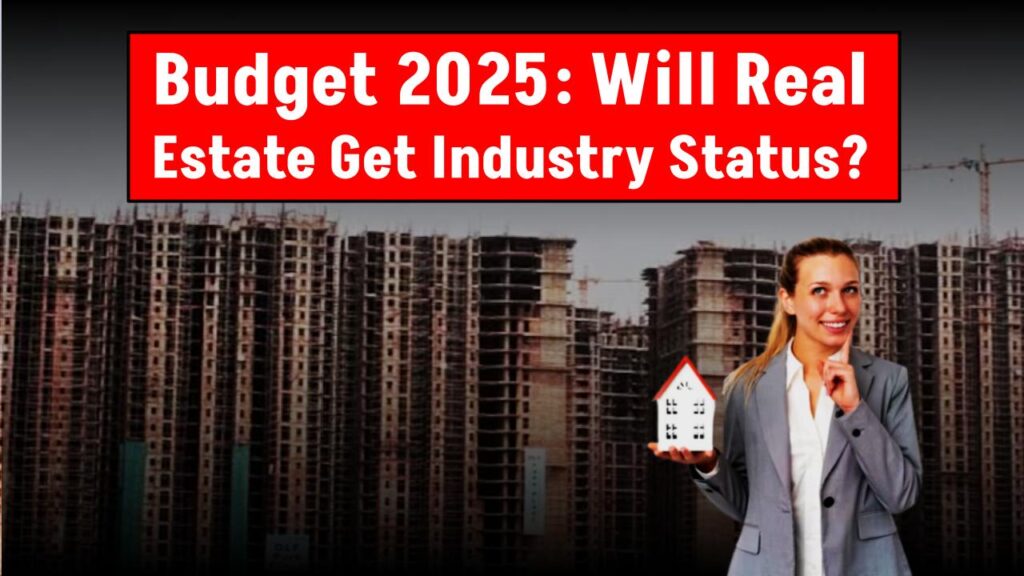Budget 2025 Expectations: In the run-up to every Union Budget, one recurring demand echoes across India’s property sector: Will real estate finally get industry status in Budget 2025? Despite decades of lobbying by developers, investors, and analysts, the answer this year is still a resounding “Not yet.” Real estate is one of India’s largest contributors to GDP and employment, yet it continues to be classified as a service sector. This classification denies it the full range of benefits available to other industries like manufacturing or IT. So, what did Budget 2025 bring instead? Let’s dive in.

Budget 2025 Expectations
| Feature | Details |
|---|---|
| Industry Status Granted | No |
| New Income Tax Exemption Limit | ₹12.75 lakh (New Regime) (Source) |
| SWAMIH Fund 2.0 | ₹15,000 crore allocated for stalled affordable/mid-income housing projects (KPMG) |
| Rental Income TDS Limit Raised | Increased from ₹2.4 lakh to ₹6 lakh annually (KPMG) |
| Official Source | www.indiabudget.gov.in |
Budget 2025 brought some relief and optimism for the real estate sector through tax breaks and financial aid. But the central demand for industry status remains unmet. This persistent omission continues to limit access to low-cost funding and institutional capital. If the government truly wants to boost housing for all and increase GDP contribution from the construction sector, granting industry status is a critical next step. Until then, developers, buyers, and investors must navigate the complexities of a sector still searching for formal recognition.
Why Industry Status Matters
The demand for industry status for the real estate sector is not new. But why does it matter so much? Here’s a simple way to think about it:
- When something is classified as an “industry,” it gains easier access to credit from banks.
- It can attract institutional investors, like pension funds and insurance companies.
- Developers benefit from lower interest rates, better infrastructure financing, and streamlined approvals. In short, giving real estate industry status would reduce its dependence on high-cost private funds and help bring transparency and accountability to the sector.
“Granting industry status could be the single biggest reform to boost affordable housing,” says Dhruv Agarwala, Group CEO, Housing.com (Source).
Budget 2025: What It Did Offer Instead
While industry status was not granted, the budget introduced several reforms that could have a positive trickle-down effect:
1. Tax Reform: Increased Exemption Limit
The new income tax regime exemption limit has been raised to ₹12.75 lakh, giving individuals more disposable income.
- This means a family earning within this range may now save lakhs in taxes, which can be redirected to big-ticket purchases like homes.
- More money in hand = higher chances of homebuying, especially for first-time buyers.
2. SWAMIH Fund 2.0: Relief for Stalled Projects
A new ₹15,000 crore Special Window for Affordable and Mid-Income Housing (SWAMIH) has been launched.
- This fund will help revive stalled projects that are otherwise financially viable.
- Homebuyers waiting for delayed possession may finally see light at the end of the tunnel.
- This also eases the burden on NBFCs and developers struggling with liquidity.
3. Rental Income: Higher TDS Limit
The annual TDS threshold for rental income has been raised from ₹2.4 lakh to ₹6 lakh.
- This eases compliance and tax filing for landlords.
- Helps boost the rental housing market, especially in metros where rents often exceed the older threshold.
Real Estate Still in Limbo Without Industry Status
Despite these well-meaning policy moves, the absence of industry status continues to haunt developers:
- Interest rates on construction finance are often 3-4% higher than other industries.
- Institutional investors remain wary due to perceived risk and lack of formal classification.
- Smaller developers suffer more, as they lack the capital cushion to absorb high borrowing costs. This leads to delayed projects, increased buyer grievances, and reduced trust in the sector.
What Needs to Happen Next
Here’s what stakeholders suggest for the next steps:
Push for Comprehensive Real Estate Reform
- Recognize real estate as a core infrastructure-linked industry.
- Simplify land acquisition laws, which are a major bottleneck.
- Digitize land records and approval processes to curb corruption.
Strengthen RERA Implementation
The Real Estate (Regulation and Development) Act, or RERA, is a landmark law. But its implementation varies from state to state.
- Strengthen RERA authorities to ensure faster dispute resolution.
- Increase penalties for non-compliance by developers.
Invest ₹1 Lakh or ₹2 Lakh in This Post Office Scheme—Here’s How Much You’ll Actually Get Back
Government-Run Firm Defaults on Huge Loan—Modi Govt Scrambles Into Action
FAQs on Budget 2025 Expectations
1. What is industry status and why is it important for real estate?
Industry status allows a sector to access institutional credit, get tax and infrastructure support, and attract global investments.
2. Has any part of real estate been granted industry status?
Only affordable housing has received some benefits similar to industry status, but the sector as a whole has not.
3. What is the SWAMIH Fund?
The SWAMIH (Special Window for Affordable and Mid-Income Housing) fund supports stalled but viable housing projects. A second phase worth ₹15,000 crore was launched in Budget 2025.
4. How does the new income tax limit affect home buyers?
Buyers now have more disposable income, which could make EMIs more affordable and increase home purchases.





